Senior Iranian ‘death committee’ judge dies
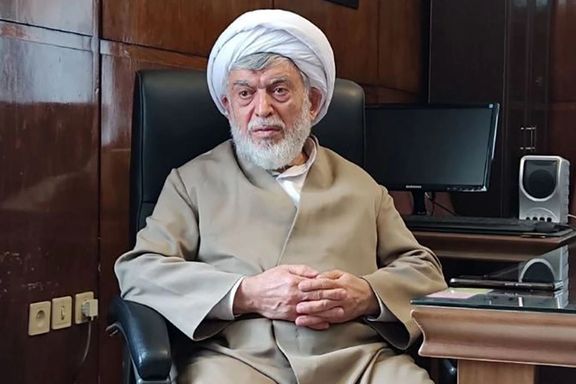
A high-ranking Iranian judge and member of the so-called Death Committee which oversaw the execution of thousands of dissidents in the late 1980s, has died.

A high-ranking Iranian judge and member of the so-called Death Committee which oversaw the execution of thousands of dissidents in the late 1980s, has died.
The head or Iran's judiciary issued a condolence message on Thursday saying Hossein Ali Nayeri had been bedridden due to a lengthy illness, attributing the sickness to his years of work.
"Certainly, this ailment was due to many years of service to the holy system of the Islamic Republic of Iran and the judiciary," Gholamhossein Mohseni Ejei was quoted as saying by the judiciary's Mizan news agency.
Nayeri's death comes after a court employee in January shot dead two veteran Supreme Court judges, Mohammad Moghiseh and AliRazini, before killing himself. Initial news reports at the time mentioned a third judge being injured but officials said an injured bodyguard was the only other victim.
Born in 1956, Hossein Ali Nayeri served as the religious judge of Tehran's Evin Prison from 1983 to 1989 and was appointed by the founder of the Islamic Republic Ruhollah Khomeini.
During this period authorities routinely executed political prisoners. Nayeri was a key member of a judicial panel - later known as the "Death Committee" - which condemned thousands of prisoners to death in the summer of 1988.
Following his tenure at Evin Prison, Nayeri served as the Deputy Chief Justice of the Supreme Court from 1989 to 2013 and as the head of the Judges Disciplinary Court from 2013 to 2022.
On Wednesday, a hacktivist group said the Iranian police intelligence agency has issued thousands of gun permits to senior state officials to fend off assassination.
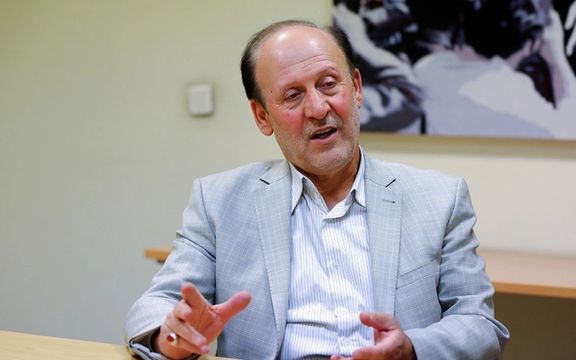
A former senior Iranian diplomat has warned that certain actors are actively working to prevent improved relations between Iran and the West, emphasizing the need for Tehran to maintain a balanced foreign policy with all global powers.
Jalal Sadatian, who previously served as Iran’s ambassador to the United Kingdom, told the ILNA news website in Tehran: “It is important to recognize that there are serious enemies of Iran’s national interests who do not want to see improved relations with Europe and the United States.”
In recent months, numerous media outlets, political figures, and former officials have cautioned against relying on Russia as a mediator between Tehran and the West, accusing Moscow of seeking to keep Iran within its own geopolitical orbit.
“Maintaining a balanced foreign policy is essential to safeguard the country’s national interests and security,” Sadatian said, adding, “We must remain aware of the severe risks posed by sanctions in order to navigate this critical phase successfully.”
The former diplomat pointed out that the dynamics of the Middle East have shifted dramatically, citing Israeli strikes on Hamas and Hezbollah, as well as the fall of Syria’s Bashar al-Assad. He emphasized that the Islamic Republic has effectively lost its military foothold in Syria.
Sadatian also noted a shift in Iraq’s political landscape—one that appears unfavorable to Iran. He highlighted growing pressure from senior Iraqi officials and Shiite religious leaders on pro-Iran militias to either disarm or formally integrate into the Iraqi army.
On the prospect of renewed talks with the United States, Sadatian warned that Tehran must remove “serious and illogical impediments rooted in domestic political disputes.” He added, “We must be aware of the serious dangers posed by sanctions in order to navigate through this phase successfully.”

Remarks by a senior adviser to Iran’s Supreme Leader warning of Iran being pushed to produce nuclear weapons by US threats have sparked intense debate in Iran.
In a televised interview on Monday, Ali Larijani suggested that if Iran were attacked and public demand for nuclear weapons emerged, even the Supreme Leader’s religious decree (fatwa) against weapons of mass destruction could be reconsidered. Nonetheless, he insisted that Iran is not pursuing nuclear arms and remains committed to cooperating with the International Atomic Energy Agency (IAEA).
Khamenei’s ruling was presented by Iranian officials at the International Conference on Nuclear Disarmament in April 2010. But such religious decrees could be altered or overturned given the ‘requirement of time and place’ as many historical instances prove.
Many hardliners and ultra-hardliners in Tehran—typically staunch critics of the moderate conservative Larijani—have embraced his remarks on social media.
“Had any other political figure raised the possibility of the Islamic Republic moving toward nuclear weapons, they would have been accused of warmongering or bluffing. Dr. Larijani’s decision to bring it up was a wise move and a timely act of sacrifice,” wrote Vahid Yaminpour, a prominent ultra-hardliner and former state television executive, on X.
“The Iranian nation wants nuclear weapons,” declared Seyed Komail, an ultra-hardliner social media activist with 27,000 followers, in response to Larijani’s remarks.
Abdollah Ganji, former editor of the IRGC-linked Javan newspaper, dismissed concerns over potential US or Israeli strikes, arguing that Iran’s nuclear facilities are too deeply fortified to be destroyed. He warned that an attack could lead to Iran's withdrawal from the Non-Proliferation Treaty (NPT) and retaliation against US military bases and Israel.
However, Larijani’s remarks stand in contrast to official government positions. Soon after his interview, Iran’s Foreign Minister Abbas Araghchi reaffirmed on X that Iran “under no circumstances” would seek, develop, or acquire nuclear weapons, emphasizing that diplomacy remains the best course of action.
Nour News, an online outlet believed to be affiliated with Iran’s Supreme National Security Council (SNSC), also weighed in, questioning whether the US is prepared to face the consequences of further escalation.
Larijani’s statements have drawn strong criticism as well. Detractors argue that such rhetoric provides the US and Israel with an excuse to justify pre-emptive military action. “The Leader’s fatwa prohibiting nuclear weapons is absolute and without exceptions,” posted cleric Saeed Ebrahimi on X, adding that raising the prospect of nuclear bombs would only give Iran's enemies justification for aggression.
Mohammad Rahbari, a prominent political commentator in Tehran, suggested that Larijani’s remarks signaled Iran may be alarmingly close to nuclear capability—precisely the kind of pretext Israel has been seeking for a preemptive strike. Senior reformist journalist Mohammad Sahafi also warned that such nuclear posturing could alienate potential allies who might otherwise support Iran in the face of Western pressure.
“Larijani's comment was unprofessional and came from a position of weakness; it had no merit. It also gave the other side an excuse to have strong reasons for pre-emptive action and to shape a global consensus. In short, if we are concerned about our homeland, we should not take such a reckless stance,” Hemmat Imani, an international relations researcher in Iran, wrote.
Others speculate that Larijani’s remarks are part of ongoing indirect negotiations with Washington. “Ali Larijani’s ‘warning’ should be seen as a calculated move in high-level negotiations,” suggested Iranian environmental journalist Sina Jahani.
Describing Larijani’s remarks as “a form of nuclear blackmail the Islamic Republic has used as a tool of threat for years,” Arvand Amir-Khosravi, a Norway-based academic and monarchist, wrote on X that the threat was “nothing more than a propaganda ploy to gain leverage in potential negotiations,” adding that pursuing nuclear weapons would invite military retaliation rather than enhance Iran’s security.
The United States Office of the Director of National Intelligence reported in November 2024 that, as of September 26, Iran was not actively building a nuclear weapon. However, last month, Rafael Grossi, director general of the International Atomic Energy Agency (IAEA), described Iran’s nuclear program as extremely ambitious and wide-ranging. He warned that the country's uranium enrichment had reached near weapons-grade levels and was alarmingly close to the threshold for acquiring nuclear weapons.
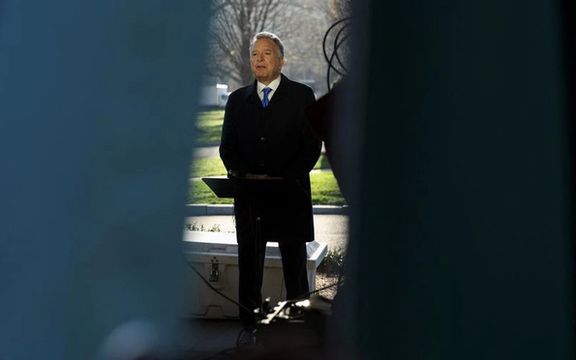
US President Donald Trump's special envoy Steve Witkoff reacted "great" on Wednesday to a spirited statement by Iran's foreign minister on X before swiftly deleting the post.
It was not immediately clear if the expunged monosyllable, which marks the first public interaction between Tehran and the Trump administration, was meant in earnest, irony or error.
Witkoff's office did not immediately respond to an Iran International request for comment.
Tensions between Tehran and Washington have ramped up in recent days after Trump mooted bombing the country.
Foreign Minister Abbas Araghchi had written four paragraphs lamenting Washington's exit from a nuclear deal and recent talk of attacking Iran.
"10 years after signing the JCPOA—and 7 years after the US unilaterally walked away from it—there is not ONE SHRED OF PROOF that Iran has violated this commitment," Araghchi wrote, referring to a 2015 agreement from which the United States withdrew in Trump's first term.
"Diplomatic engagement worked in the past and can still work. BUT, it should be clear to all that there is—by definition—no such thing as a 'military option' let alone a 'military solution'," he added.
Witkoff, who has spearheaded talks for Trump in Israel-Hamas and Ukraine-Russia conflicts as part of the populist President's bid to wind down foreign reports, replied simply: "Great".
Within minutes, the reply was deleted from Witkoff's account.
The post came weeks after after a leaked chat among senior administration officials including Witkoff about plans for an imminent attack on the Iran-aligned Houthi group in Yemen sparked consternation in Washington among Trump's opponents.
Critics said the inclusion of a prominent journalist in the group and the discussion of sensitive military plans on a commercial chat app, Signal, endangered national security and revealed too much about official thinking and intelligence sources.
Trump on Sunday warned that Iran could face bombing and secondary tariffs if a nuclear deal was not reached with Washington. The remarks prompted a sharp riposte from Iranian Supreme Leader Ali Khamenei, who warned of a "heavy blow in return" if Iran were attacked.
Trump had previously reached out to Khamenei in the form of a personal letter in an attempt to explore a new nuclear agreement and prevent military escalation, Witkoff said late last month.
"We don't need to solve everything militarily," Witkoff told Fox News.
"Our signal to Iran is let's sit down and see if we can, through dialogue, through diplomacy, get to the right place. If we can, we are prepared to do that. And if we can't, the alternative is not a great alternative."
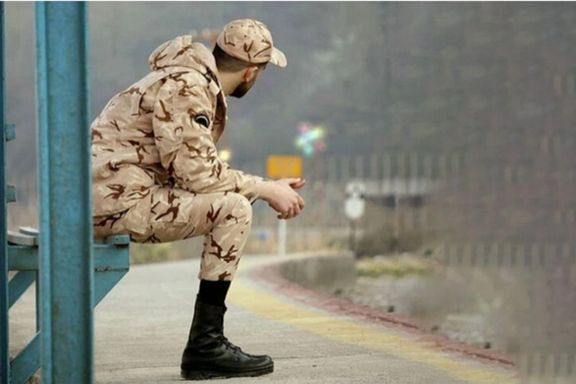
Soroush Salehi campaigned to have Canada label Iran’s Revolutionary Guards a terrorist group but now the law for which he strived may eject him and others forced into the group as conscripts.
In June of last year, Soroush celebrated Canada's decision to list the Islamic Revolutionary Guard Corps (IRGC) as a terrorist entity.
Little did he know, however, that his activism to ostracize the group that had dragooned him into service would upend his own life.
Soroush is part of a community of Iranians living in Canada who bitterly resent their country's rulers for impressing them into the Islamic Republic's security forces.
Along with the regular military and police, the IRGC is another agency that Iranian men could be forced to join to complete their mandatory military service.
A transnational paramilitary force, the Revolutionary Guards spearhead Tehran's influence in the Middle East, including training and arming of affiliates like Hamas, Hezbollah, the Houthis and Iraqi militias.
Now their lives on Canadian soil are in jeopardy and are left to the discretion of immigration officers who may deem them inadmissible under the new policy.
Iran International spoke to Soroush and two other Iranian nationals whose permanent residency applications are also in limbo and who do not wish to be identified due to security concerns. Iran International has also reviewed evidence demonstrating the men were conscripts and not permanent IRGC servicemen.
From advocate to victim
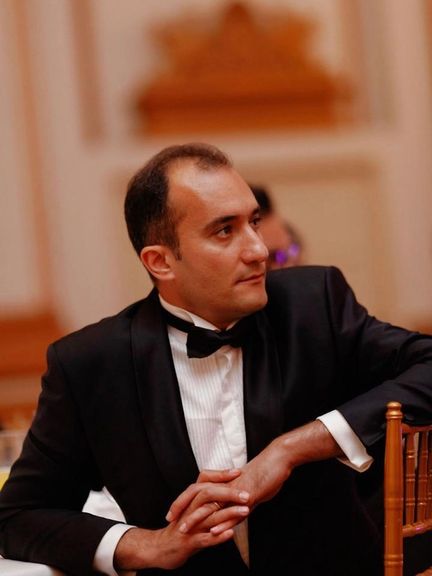
Soroush Salehi washed dishes and carried out other menial tasks and errands as an IRGC conscript fulfilling his mandatory service more than 18 years ago in Iran.
The mechanical engineer moved to Calgary, Alberta in search of a peaceful life, leaving his theocratic homeland where he saw no future.
He came to Canada in 2022 in the same year Iran's clerical rule saw the biggest challenge to their system in decades as the so-called Woman Life Freedom protest movement swept the country, only to be quashed with deadly force.
Soroush chose Canada after being rejected by the United States in 2020, despite his wife's American citizenship, after US immigration authorities deemed him a “member of a terrorist organization.”
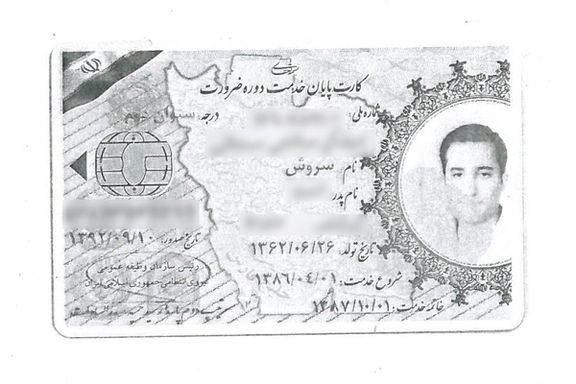
After US President Donald Trump put the IRGC on the US terrorist list in 2019, no exemptions were made for conscripts. Promises by President Joe Biden’s administration to look into exempting conscripts never materialized.
Now Soroush may be deemed inadmissible in Canada, too. Soroush is currently a temporary resident under a work permit and if no exemptions are provided, he might be deemed inadmissible and deported.
“I had dreams with my wife for a life here. Everything was good until September 2024,” Soroush told Iran International, “All my dreams are going to be devastated and are going to be shattered.”
Humiliation

Shahed, whose declined to use his real name citing security concerns, lives in Vancouver, British Columbia with his wife and five-year-old son who was born in Canada, who is a citizen.
From 2013 to 2015, Shahed completed his mandatory military service with the IRGC, and was tasked with administrative work, never training in military activities. The experience was deeply degrading, he said.
“The only purpose is just humiliating you, sitting there and cleaning the desk.”
In Canada with a work permit as an on-site engineer, Shahed's permanent residence application has been under review for more than three years.
Shahed had officially declared his mandatory military service and provided an ID card indicating the end of his mandatory service in a sworn affidavit reviewed by Iran International.

But he received and official letter saying immigration officers had “concerns surround your membership to the IRGC.”
“Based on your previous membership to the IRGC, I have reasonable grounds to believe you may be inadmissible to Canada ... (based on) membership in an organization that has engaged in subversion or terrorism,” the letter said. Shahed has responded protesting his innocence but has yet to hear back from authorities.
“Every day I have to deal with the stress when I wake up and be prepared that today I could be inadmissible and would have to leave Canada,” Shahed said. “I am not safe anymore.”
Shahed took part in Canadian protests in support of the 2022 unrest in Iran and fears for his safety if deported back to Iran.
Divorce - a way out?

Iran International spoke to another conscript and his wife over Zoom. They too did not want to be identified for their protection and for the safety of their family in Iran.
Since the designation, their lives are mired in uncertainty.
“This decision by the government is affecting every aspect of our lives,” said Farid's wife Roya. “We feel like prisoners here.”
They are both on an open work permit and applied for permanent residency in 2024, but since the IRGC designation their application has been stuck in security checks.
The married couple said they have decided not to leave Canada to travel or visit family because they fear being barred reentry.
Major life decisions like starting a family and buying a house have all been put on hold. If Farid is deported, they said they will likely get a divorce so his wife can have a life in Canada.
Farid told Iran International he served his mandatory service more than 10 years ago and never took part in military drills but worked in a clerical role at an Iranian bank.
Random process
The process in Iran for selecting conscripts to the various branches - whether for the regular army, the IRGC or law enforcement - is random.
Islamic Republic officials tasked with picking conscripts and officers often select recruits by pointing out young men arrayed in a line in front of them.
Prior to listing the IRGC a terror entity, Canada’s former Prime Minister Justin Trudeau had resisted calls to make the designation because of the plight of conscripts.
Activists continued to lobby for the change, arguing that identifying those low-level conscripts was an easy and verifiable task.
The terrorist designation empowers the justice system to prosecute IRGC members who have obtained Canadian citizenship and hold them criminally liable for crimes committed overseas.
On the fourth anniversary of the IRGC's downing of a civilian airliner which killed scores of Canadian citizens and residents, Trudeau said in Jan. 2024 that Canada was looking at a way to punish the group.
“We know there is more to do to hold the regime to account and we will continue our work, including continuing to look for ways to responsibly list the IRGC as a terrorist organization.”
When the official announcement was made, Justice Minister Arif Virani said an individual’s willingness and intent to support the IRGC would be an important consideration under the Criminal Code.
Immigration, Refugees and Citizenship Canada told Iran International that applications are considered on a case-by-case-basis.
“Conscription, in itself, does not necessarily result in a person being deemed inadmissible to Canada," it said. "The admissibility of individuals will be assessed based on a number of considerations."
Those range from the nature of their role in the IRGC to their level of engagement with the organization, it added.
Sadeq Bigdeli, a Toronto-based lawyer who represents several conscripts, said probably only under ten former conscripts have been deemed inadmissible by courts.
Bigdeli said he submitted a petition for guidelines excepting conscripts and even provided a draft text.
“It's not only unfair, but also basically helping the Islamic Republic by diverting resources from where they should be: the real terrorists."
While IRGC conscripts have declared their service voluntarily, actual IRGC members - whom Bigdeli called "masters of deception" – are likely walking free in Canada.
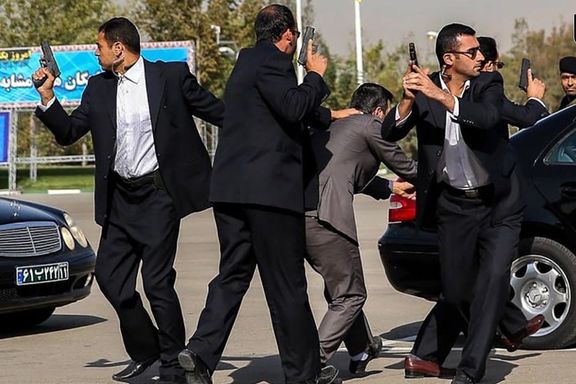
The Iranian police intelligence agency has issued thousands of gun permits to senior state officials in what a hacktivist group described as an unprecedented response to fear of internal reprisals.
Edalaat-e Ali, a group that has previously leaked surveillance footage and official documents, said the Law Enforcement Command of the Islamic Republic authorized the distribution of over 3,000 pistols to senior government officials.
The weapons, including stun guns and pepper spray, were issued following a clearance process involving three levels of vetting.
"This extraordinary move reveals the extent to which Iran’s leadership anticipates retaliatory action from its own citizens," Edalaat-e Ali wrote on X, saying the measure stemmed from fears that officials would be identified in future uprisings.
The group’s report could not be immediately verified by Iran International, but Iran has seen mounting tensions over economic hardship, water scarcity and political repression in recent months.
According to security sources cited by Edaalat-e Ali, personnel within the Islamic Revolutionary Guard Corps and the Intelligence Ministry had already received similar equipment for years.
The report surfaced shortly after farmers in central Iran torched a water transfer station in Isfahan province, disrupting supply to Yazd, amid a long-running dispute over access to the Zayandeh Rud river.
In January, two Supreme Court judges and clerics Mohammad Moghiseh and Ali Razini, both were shot dead in Tehran in a rare deadly attack on senior officials.
The assailant, a staff member responsible for refreshments at Iran's judiciary headquarters, committed suicide after the shooting. The judges were stalwart ideologues who had handed down harsh sentences on dissidents for decades.
“If the enemies think they can instigate sedition within the country, the Iranian nation itself will respond,” said Supreme Leader Ali Khamenei on Monday.
Security directives have tightened nationwide, particularly at police stations and military facilities, according to the hacktivist group.
Edalaat-e Ali added that daily visitor numbers are now capped and ammunition stores reduced, citing fears that weapons could fall into civilian hands in case of a takeover.
The Iranian government’s response to public dissatisfaction has largely been marked by repression, including what happened in the wake of the death of Mahsa Amini in police custody in September 2022.
The tragedy triggered widespread protests across the country under the slogan “Woman, Life, Freedom".
What began as outrage over Amini’s death rapidly transformed into a broader movement against the government, driven by long-standing political and social grievances. Authorities responded with mass arrests and a forceful crackdown, leading to over 500 deaths among demonstrators, according to rights groups and the United Nations.
Despite the efforts to silence dissent, the likelihood of future unrest remains high, not least as at least one third of the country now lives below the poverty line.
Years of economic mismanagement, widespread corruption, and the weight of international sanctions have deepened crises like fuel shortages and power outages, compounding public anger.
The government’s reluctance to raise fuel prices—mindful of the deadly 2019 protests—highlights its recognition of the growing risk of renewed demonstrations.